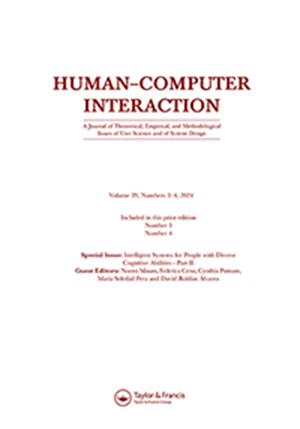Exploring the effectiveness of persuasive games for disease prevention and awareness and the impact of tailoring to the stages of change
IF 4.5
2区 工程技术
Q1 COMPUTER SCIENCE, CYBERNETICS
引用次数: 5
Abstract
ABSTRACT Persuasive games are widely implemented in the healthcare domain to promote behaviour change among individuals. Previous research shows that using persuasive games increases motivation and awareness, leading to a positive change in behaviour. However, there is little knowledge on which persuasive strategies will motivate people at different Stages of Behaviour Change and whether tailoring persuasive games to match users’ stages of change will increase their effectiveness with respect to their motivational appeal towards promoting disease awareness and prevention using the ARCS motivation scales and their intention to adopt the precautionary measures. To address this gap, using COVID-19 as a case study, we designed two different versions of a persuasive game, called COVID Pacman, using different persuasive strategies. The two versions of the game target the same goal of motivating the adoption of precautionary measures. We conducted a quantitative study (N=127) followed by semi-structured interviews of 18 participants. The results of conducting an ANOVA on the quantitative data and thematic analysis on the qualitative study show that tailoring the persuasive games to individual’s stages of change by using appropriate persuasive strategies increased their effectiveness with respect to their ability to motivate people to adopt the precautionary measures towards disease prevention compared to the non-tailored version.探索说服性游戏对疾病预防和意识的有效性,以及适应变化阶段的影响
有说服力的游戏在医疗保健领域广泛实施,以促进个人之间的行为改变。先前的研究表明,使用说服性游戏可以增加动机和意识,从而导致行为上的积极变化。然而,关于哪些说服策略将激励处于不同行为改变阶段的人们,以及定制说服游戏以匹配用户的改变阶段是否会增加其有效性,这涉及到使用ARCS动机量表促进疾病意识和预防的动机呼吁以及他们采取预防措施的意图。为了解决这一差距,我们以COVID-19为案例研究,设计了两个不同版本的说服游戏,称为COVID吃豆人,使用不同的说服策略。这两款游戏的目标都是促使玩家采取预防措施。我们进行了一项定量研究(N=127),随后对18名参与者进行了半结构化访谈。对定量数据进行方差分析和对定性研究进行专题分析的结果表明,通过使用适当的说服策略来定制说服游戏以适应个人的变化阶段,与非定制版本相比,在激励人们采取预防措施以预防疾病方面提高了其有效性。
本文章由计算机程序翻译,如有差异,请以英文原文为准。
求助全文
约1分钟内获得全文
求助全文
来源期刊

Human-Computer Interaction
工程技术-计算机:控制论
CiteScore
12.20
自引率
3.80%
发文量
15
审稿时长
>12 weeks
期刊介绍:
Human-Computer Interaction (HCI) is a multidisciplinary journal defining and reporting
on fundamental research in human-computer interaction. The goal of HCI is to be a journal
of the highest quality that combines the best research and design work to extend our
understanding of human-computer interaction. The target audience is the research
community with an interest in both the scientific implications and practical relevance of
how interactive computer systems should be designed and how they are actually used. HCI is
concerned with the theoretical, empirical, and methodological issues of interaction science
and system design as it affects the user.
 求助内容:
求助内容: 应助结果提醒方式:
应助结果提醒方式:


